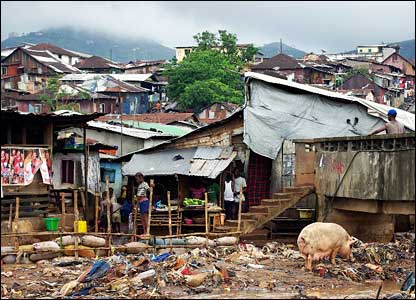Health Hazards In Kroo Bay Community
Kroo Bay is an informal risk prone housing settlement along coastal and riverbed lands in central Freetown, the capital of Sierra Leone. The population living in flood prone areas is considered more vulnerable due to increased exposure to loss of life and property, sickness and disease.
These communities are considered the poorest and Kroo Bay with a population of about 6000 people is one of the biggest slumps that has suffered greatly from environmental problems such as annual floods, poor sanitation and personal hygiene, lack of latrines, erosion and filth and waste disposal.
Dwellers in Kroo Bay usually experience a high rate of disease especially among the young. These diseases are easily transmitted, and the factors attributed to higher rate of disease transmission include high population densities, poor living conditions, low vaccination rates, insufficient health related data and inadequate health services.
Overcrowding leads to faster and wider spread of diseases due to the limited space in slum housing. Poor living conditions also make the residents more vulnerable to outbreaks. Lack of portable water is also a major cause of many illnesses. While grownups use the overflowing water to dispose of their excreta and washing at the same time, children and pigs also use the same water as playground.
General waste management and toilet services are key indicators in the measurement of living environment of human beings. The absence of these facilities depicts a potential epidemic.
The Kroo Bay settlement is characterized by lack of regulated waste management system. The risk of water borne disease is high due to very probable contamination of water sources from sewage and inadequate health services. So, solid waste disposal is a major development challenge to residents of Kroo Bay, and the commonest way of disposing domestic waste is throwing them into the sea and nearby drains which ends up in water ways and drainages. The resulting water logging and contamination increases the risk of water borne diseases.
According to the secretary of Kroo Bay community Mr. Mohamed K Bangura, residents of Kroo Bay lack adequate access to sanitation and health services. It is not surprising that basic personal hygiene is a serious challenge to the people; malaria, cholera, typhoid, and diarrhea were identified as major ailments affecting the people living in the community, and their children are more vulnerable to these diseases. According to the chief of Kroo Bay community, regular cleaning around the settlement and desilting of choked drains are not commonly practiced in the settlement.
The high incidence of chocked drains is one of the reasons why Kroo Bay is tagged as one of the most flood prone areas in Freetown.
In my interview with Saidu Sessay a member of the community, he talked about some of the problems affecting them and 70% is environmental problems.
He says that residents at Kroo Bay have expressed dissatisfaction at levels of poor availability and access to toilet services. The entire community only has 4 traditional pit latrines used generally and only one is said to be in good condition in terms of cleanliness. Residents towards the sea have difficulties accessing the latrines, they pay money to access these public toilets, therefore, open defecation is still being practiced by some residents. Apart from latrines, sources of toilet service are the seas and open drains.
The ownership and management of these latrines are in the hands of city council, and the community has no control and cannot interfere with the conditions of these facilities. The secretary of Kroo Bay community Mohamed K Bangura described the toilet facility in the settlement to be very poor and says that efforts must be made to provide appropriate toilet facilities in the community.
Another member of the community Kadiatu Sesay explains that, due to lack of skills and proper education, as well as competitive job market, dwellers of Kroo Bay face high rate of unemployment. The lack of job opportunity causes many of them to employ themselves in the informal economy, by engaging petty trading for their livelihood.
“70% percent of the women in the settlement are bread winners of the family while their husbands are fisher men, and some rare pigs”, she said.
She further explains the bitter experiences they have had and are still going through in the community. They live in an area prone to natural disaster such as floods during the raining season and also fire accident is another major risk mostly caused by electricity or other source since the houses are too close to one another, the fire quickly spreads thereby causing a lot of destruction. She said the place is choked and the streets are too narrow to allow proper and quick access to fire fighters. Preventive measures such as community awareness, early warning systems, and working to construct disaster-prone health facilities, resilient water and sanitation systems; preparedness, including strengthening policies for disaster management and developing disaster response plans; emergency response, including containing hazardous materials and accessing infrastructure damage; and recovery measures, such as reconstructing resilient water and sanitation infrastructure; improved living conditions such as introduction to better sanitation and access to basic facilities can ameliorate the effects of diseases such as cholera, diarrhea, malaria.
Waste management facilities should be supported with vigorous education and sensitization on basic personal hygiene and environment health in Kroo Bay settlement.
The bottom line is the people living in this settlement know the risk they are in but they couldn’t leave because of poverty and high cost of living in other settlement, so they have accepted their fate.
By Samuella N. Yokie
Stay with Sierra Express Media, for your trusted place in news!
© 2021, https:. All rights reserved.






